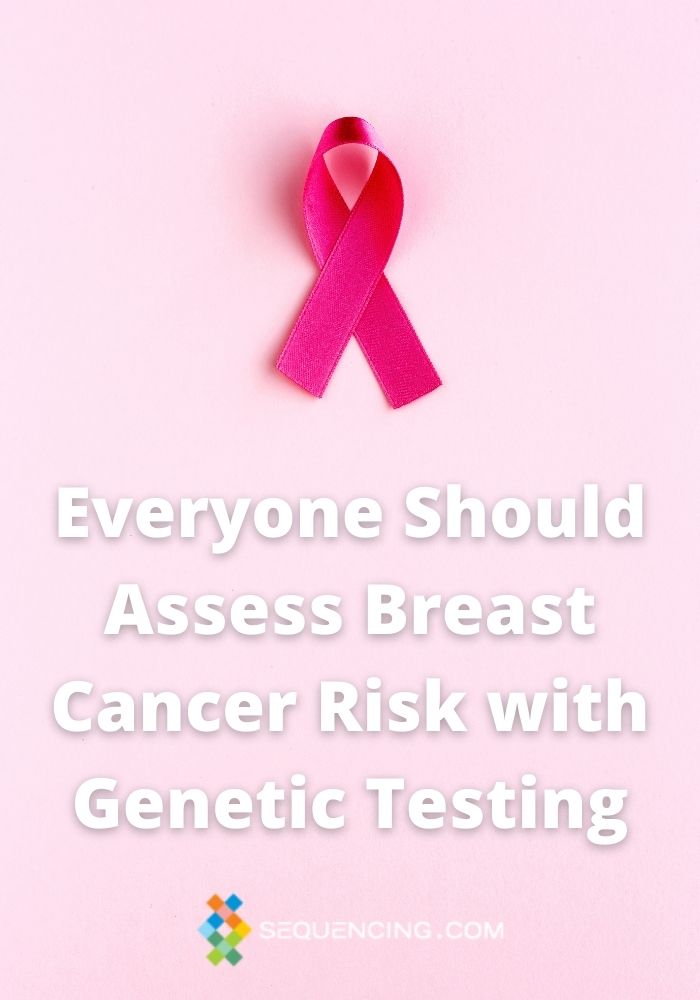The second most common cancer women suffer from is breast cancer. Survival depends on the stage treatment begins. If caught early, survival rates are much higher than if caught in the later stages of cancer's progression. Since survival does depend on how quickly the cancer is identified and treated, prevention sets the survival rate for breast cancer at nearly 100%.
Does this mean breast cancer can be prevented for those who are genetically predisposed to it? Yes, exactly. Breast cancer can be prevented, not just treated.
Who Should Prevent Breast Cancer
 Many people who have family members who suffered from breast cancer worry about suffering from it as well, but many aren't worried enough to work on prevention. Although they have an increased risk for breast cancer, most only try to identify breast cancer at the earliest stage as possible. This includes doing self-exams and mammograms every year after 40 years old.
Many people who have family members who suffered from breast cancer worry about suffering from it as well, but many aren't worried enough to work on prevention. Although they have an increased risk for breast cancer, most only try to identify breast cancer at the earliest stage as possible. This includes doing self-exams and mammograms every year after 40 years old.
Identifying breast cancer and treating breast cancer as early as possible is important in surviving the condition. It does not prevent it, though.
People of Ashkenazi Jewish descent are most at risk for breast cancer, statistically speaking. This demographic has long been studied and prevention tactics have been identified for them and others who have a higher risk for cancer, including other types, such as prostate cancer.
People who are known to be at an increased risk for cancer are not the only ones who should be concerned about preventing it - EVERYONE should be concerned with it.
Prevention is the best way to ensure breast cancer doesn't claim more people's lives, and EVERYONE should be focused on prevention first.
Does this mean self-exams and mammograms should not be performed? No, it means it should be performed along with prevention efforts.
Gene Mutations Leading to Breast Cancer
Cancer genetics has been studied for decades. With cancer, such as pancreatic cancer, claiming so many people's lives, the field has grown exponentially. By looking at the family history of breast cancer in study participants and then studying genetic mutations in those people, researchers have been able to identify signs that future generations should look for to shed light on the chances of breast cancer.
Genetic testing is how EVERYONE can prevent breast and many other cancers, such as ovarian cancer. Genetic test results can identify if people have mutated genes that increase the risk of breast cancer.
Two types of genes - BRCA1 and BRCA2 genes - individuals who have mutated BRCA1 or BRCA2 genes increase their risk to 7 in 10 chance of suffering from breast cancer by age 80.
These two genes are not the only ones that increase the likelihood someone will suffer from breast cancer, though. There are many others like palb2 and chek2. How do we know if someone has any of them? We perform genetic testing.
Again, this doesn't mean that people should not continue to check for signs of breast cancer. It simply provides additional information to people to understand how much more on top of exams they should be and consider preventive surgeries, such as a mastectomy.
Individuals who receive a positive genetic test for gene mutations are at high risk of breast cancer, so it's a good idea for them to speak with a genetic counselor. Genetic counseling provides more insight into the risk and can help people devise a prevention plan with their health care professional.
Prevention isn't just for people who have the risk factors for breast cancer, such as BRCA gene mutations - it's for EVERYONE. A risk assessment is still something that is performed on people, but many in the general population suffer from breast cancer without having any family history of it (as in a parent hasn't passed along the BRCA2 gene mutation).
Gene mutations can happen in two ways: inherited or acquired from environmental factors (carcinogens). Cancer screenings often include both of these avenues to assess the risk. Asking if the person has been exposed to high levels of radiation or other carcinogens can help understand how likely there may be gene mutations.
Learn more about genetic testing for breast cancer.
Health Insurance Companies Support Prevention
Ask anyone who has gone through cancer treatment and you'll know prevention is much easier than treating. Health insurance companies know that prevention costs are much less expensive than pricey oncology treatment options. Health insurance providers are even more motivated to cover the cost of preventive surgeries and medications such as tamoxifen or raloxifene for hereditary breast and ovarian cancers because of the increased risk of breast cancer.
Triple-negative breast cancer (10% to 20% of people who receive a breast cancer diagnosis) suffer from this type of breast cancer. Individuals with this type of breast cancer have negative test results for estrogen receptors, progesterone receptors, and excess HER2 protein. This means the growth of the cancer is not fueled by hormones, so hormonal therapy medications won't work. Other medications are available, but they are even more expensive, which is why researchers have been very anxious to find ways to interfere with the development of this type of breast cancer.
People who seek genetic information about inherited mutations on breast cancer genes can work with their health insurance provider for preventive treatment. With a risk assessment, a positive genetic test for breast cancer related inherited genes, and the recommendation from a health care provider, many insurance companies approve the costs associated with preventing breast cancer. This is also true for ovarian cancer for those who have a family history of ovarian cancer, a positive result for a specific gene related to cancer, and a doctor's recommendation.
Interesting the latest updates? Learn what's new in breast cancer genetic testing.
Genetic Tests for Breast Cancer
Breast cancer is not only treatable but it's also highly preventable, as long as people take the steps needed to understand their risk. In addition to spreading awareness about the importance of early detection, the National Cancer Institute and National Comprehensive Cancer Network have been working to increase the awareness of ways to prevent breast cancer through genetic testing.
Many people believe they need a particular medical history to warrant a genetic test - this is untrue. EVERYONE can benefit from a genetic test that identifies breast cancer gene mutations.
While genetic testing can provide very useful insight for the personalized prevention of breast cancer, there are important considerations to make before having a test. Learn more about breast cancer genetic testing: pros and cons.
How Sequencing.com Can Help with Breast Cancer Prevention

Get Free Breast Cancer Genetic Analysis
Sequencing.com is committed to helping women and men around the world lower their risk of breast cancer with ONLINE genetic analysis. This at home genetic analysis for breast cancer can help people understand their breast cancer risk easily and privately. With DNA raw data uploaded to our Prevent Breast Cancer analysis app, users can discover if they have any of the gene mutations that increase the risk of breast cancer.
Use code FIGHTSTRONG with our Prevent Breast Cancer to use the app for free. (This special discount code provides a 100% discount.)
Within minutes YOU can find out if you have the BRCA 1 or BRCA 2 gene mutations or any of the other eight genes associated with an increased risk of breast cancer. All you need is DNA data from a DNA testing company such as 23andMe, MyHeritage, Dante Labs, or Ancestry.com. Don't have it? That's no problem. You can use one of our advanced, yet affordable DNA testing kits: the Ultimate DNA test or Whole Genome Sequencing DNA testing kit.
While getting your DNA analyzed may take a couple of weeks, the results you'll receive will last a lifetime.
